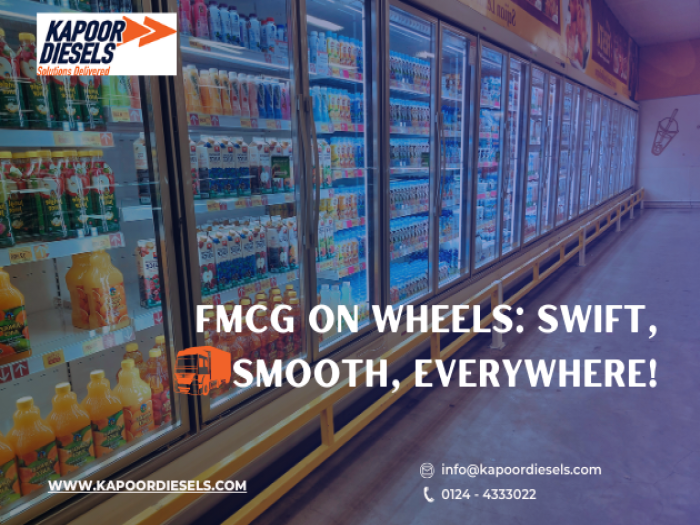
Fulfilling Consumer Desires: The Intricacies of FMCG Logistics
In the fast-paced world of Fast-Moving
Consumer Goods (FMCG), the backbone of success lies in a seamless
distribution network and efficient logistics. As the demand for these goods
escalates, the spotlight turns to the intricate workings of FMCG logistics
in meeting consumer needs. India, with its burgeoning FMCG industry,
showcases a dynamic landscape where timely delivery and precision reign
supreme. Let's delve into the fascinating realm of FMCG logistics and its
pivotal role in driving the industry's growth.
How does FMCG Logistics work for Kapoor Diesels: Kapoor Diesels, a prominent player in the FMCG logistics sphere, operates on a robust distribution network that spans across the diverse Indian market. Leveraging cutting-edge technology and an agile supply chain, Kapoor Diesels ensures the swift movement of FMCG products, meeting consumer demands with unparalleled efficiency and reliability.
Elements of FMCG Logistics: At its core, FMCG logistics encapsulates a multifaceted system comprising warehousing, transportation, inventory management, and distribution. The seamless integration of these elements forms the crux of an effective logistics framework in the FMCG sector. It necessitates streamlined processes, real-time tracking, and optimized routes to ensure prompt delivery while minimizing costs.
Benefits of 3PL Services for the FMCG Industry: Third-Party Logistics (3PL) services have emerged as a boon for the FMCG industry. Their specialized expertise in managing logistics operations offers scalability, cost-efficiency, and access to advanced technologies. 3PL providers optimize supply chains, enabling FMCG companies to focus on core competencies and strategic growth.
Logistics operations in the FMCG industry: In the FMCG landscape, logistics operations are intricate, demanding, and time-sensitive. Meeting the rapid turnover of goods while maintaining quality standards necessitates agile processes. FMCG logistics involve meticulous planning, inventory optimization, and swift transportation to cater to dynamic consumer demands.
Logistics solutions in the FMCG industry: To tackle the challenges of the FMCG sector, logistics solutions have evolved, integrating digital technologies like IoT, AI, and data analytics. These innovations enable real-time tracking, predictive analysis for demand forecasting, and agile inventory management, fostering efficiency and adaptability.
The FMCG industry demands efficient logistics processes: Efficient logistics processes are the lifeline of the FMCG industry. Timely deliveries minimized stockouts, and optimized inventory levels play a pivotal role in meeting consumer expectations. Striking a balance between supply and demand is imperative for sustained growth and market competitiveness.
Business opportunities for FMCG logistics in the future: The future of FMCG logistics holds promising prospects. As consumer demands diversify and markets expand, the need for agile, eco-friendly, and tech-driven logistics solutions will skyrocket. FMCG companies are set to explore innovative collaborations and sustainable practices to optimize logistics, tapping into emerging markets and catering to evolving consumer preferences.
Conclusion: In the relentless pursuit of meeting consumer desires, the FMCG industry relies on well-oiled logistics machinery. Embracing technological advancements, strategic partnerships, and sustainable practices will be the cornerstone for FMCG companies to thrive in this dynamic landscape. Efficient FMCG logistics isn't just a necessity; it's the catalyst propelling the industry towards greater heights of success.
Frequently Asked Questions
· Why is efficient logistics crucial for FMCG businesses?
Efficient logistics ensure timely delivery of perishable and high-demand goods, meeting consumer expectations. It minimizes stockouts, reduces costs, and fosters competitiveness in the fast-paced FMCG industry.
· What are the key components of FMCG logistics?
Key components include warehousing, transportation, inventory management, and distribution. These interlinked elements ensure the smooth movement of goods from production to consumption.
· How does FMCG logistics differ from other types of logistics?
FMCG logistics prioritize speed and turnover due to the perishable or high-demand nature of goods, unlike other logistics that might focus on durability or customization.
· What challenges do FMCG logistics face?
FMCG logistics confront challenges like short shelf life, fluctuating demand, maintaining product quality during transportation, and managing a complex supply chain.
· How does technology impact FMCG logistics?
Technology revolutionizes FMCG logistics by offering real-time tracking, predictive analytics, IoT-driven inventory management, and automated processes, enhancing efficiency and accuracy.
· What strategies can FMCG companies use to optimize their logistics?
Strategies include adopting agile supply chains, embracing data-driven decision-making, collaborating with 3PL providers, employing advanced technologies, and implementing demand forecasting models.
· How can FMCG companies manage inventory effectively in their logistics operations?
Effective inventory management involves predictive analysis, demand forecasting, optimizing stock levels, implementing JIT (Just-In-Time) practices, and utilizing inventory tracking systems.
· What role does sustainability play in FMCG logistics?
Sustainability in FMCG logistics involves eco-friendly packaging, optimized transportation routes to reduce carbon footprint, and adopting green practices in warehousing and distribution.
· How do FMCG companies handle seasonal demand fluctuations in logistics?
FMCG companies prepare for seasonal demand by implementing flexible production schedules, adjusting inventory levels, and utilizing predictive analytics to forecast demand spikes.